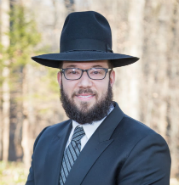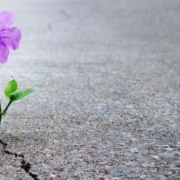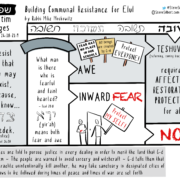Re-educating the Natural Order / Graceful Masculinity: Vayeshev
Part of a year-long Torah series on graceful masculinity and Jewish values.
וַיִּרְאוּ אֶחָיו, כִּי-אֹתוֹ אָהַב אֲבִיהֶם מִכָּל-אֶחָיו–וַיִּשְׂנְאוּ, אֹתוֹ; וְלֹא יָכְלוּ, דַּבְּרוֹ לְשָׁלֹם.
His brothers saw that it was he whom their father loved most of all his brothers so they hated him and were not able to speak to him peacefully. (Genesis 37:4)
This coming Sunday night, we begin to celebrate the eight day festival of Chanukah. The Beis Yosef famously asks – Why are there eight days? If there was enough oil for the first day, wasn’t the miracle in fact only for 7 days? Why then isn’t the festival just seven days long?
One of my favorite answers is supplied by the Ba’aeli Mussar. They teach that indeed everything in the world is miraculous. It is just that we are so accustomed to everyday wonders that we call them “natural.” If G-d willed for water to burn and oil to extinguish, then our “normal” would be perceived as the supernatural. Chanukah is a time to question what is real, and what we’ve simply accepted as truth because we are used to it. At Chanukah we acknowledge and appreciate the hidden light in the seemingly mundane.
This week’s parsha, Parshat Vayeshev, is also one of hidden light. People who are discounted, rejected, and dismissed turn out to be the mainstays of redemption. Joseph, the younger brother, is thrown into a pit, nearly killed, and sold as a slave, but he then becomes the viceroy of Egypt and is able to save everyone from famine. According to the medrash, after Shechem rapes Dina, she becomes pregnant and gives birth to Asnos. Dina’s brothers want to abandon the baby but Jacob intervenes and arranges for her to be adopted by an Egyptian family. This baby girl, according to the midrash, grows up and marries Joseph. Together they parent Menashe and Efrayim, the first brothers to ever get along with each other. This light, hidden below the surface, is able to shine — and to disturb the system of artificially evaluating human worth, the system that discounted both Joseph and Dina..
So too with Tamar. Yehuda wanted to execute her because he assumed that she had become pregnant through harlotry, when he himself was in fact the father. When Tamar reveals the truth to Yehuda, he declares that she is more righteous than he. Tradition teaches that the Messiah of the Davidic line is descended from Tamar, while the Messiah of Joseph’s line comes from Asnos. (Yes, tradition speaks of two messiahs.) What’s important here is that each of these figures is descended from someone who was considered unworthy of living but survived and became a necessary agent of salvation… just like Joseph.
And in the times of the Chanukah story, when men were passive in the face of evil decrees and bride trafficking, it was Yehudis who had faith in the power of change. She resisted, rebelled, and revolted. Chanukah is the only Jewish holiday that falls during two different months, demonstrating its own ability to incorporate shifts in the changing of time.
The name Chanukah comes from the language of chinuch, education. Now, like during the Chanukah story, we must actively pursue a constant re-education about what is right and appropriate. One of the indicators that we are being successful is whether or not we are producing chein, gracefulness,1, also at the root of both words.
The Greeks wanted us to forget the Torah and its eternal truth: that real power doesn’t rest in physical strength or gatherings of men, but in the One Who “delivered the strong into the hands of the weak, the many into the hands of the few”. The candles that we light each night remind us of our partnership with the Divine and the source of holiness that is our most precious resource.
We live in very dark times, but dark times contain hidden light. The medresh teaches that while everyone was busying themselves in these painful narratives, G-d was involved and was creating the light of redemption. When we challenge structures that support oppressors, we are shining the light of truth that is the most disruptive to oppression. The rebellions of today’s resistance are no less miraculous or courageous, perhaps they just feel more natural.
Discussion questions:
What are some of the changes that we have seen, in the last one hundred years, toward gender equality?
Where are changes today most needed in society?
Can systems and institutions that have contributed negatively change from the inside?
How can we use this Chanuka to affect change?
1.חנוכה גימטריא חן א-ל Chanukah has the same numerical value of “G-dly grace”.↩

By Rabbi Mike Moskowitz. See other #MenschUp posts here.









